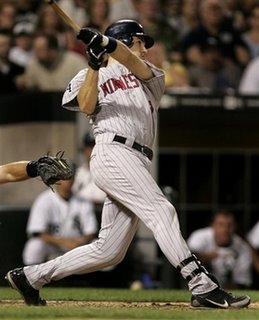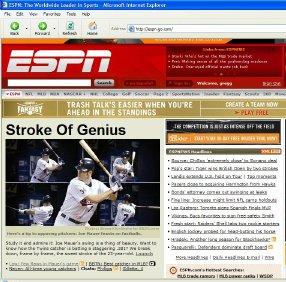July 24, 2006
Twins 7, White Sox 4
Last night was a perfect example of why, as the saying goes, the games aren't played on paper.
With the Twins clinging to a 3-2 lead in the seventh inning, Joe Mauer came to the plate against left-handed reliever Neal Cotts with runners on the corners and two outs. While Mauer worked the count to 2-1, Nick Punto got himself into scoring position by stealing second base. Rather than engage in the now-common practice of walking Mauer to face Michael Cuddyer, the White Sox chose to pitch to him.
The decision not to hand Mauer an intentional walk made sense because of the favorable lefty-on-lefty matchup, but also because Mauer came into the game with 287 career at-bats against southpaws, all without hitting a single homer. Meanwhile, Cotts came into the game having held left-handed hitters to a .215 batting average over his career, including a measly .141 this season.
Surely you can guess what happened next, because it's basically the opposite of what the numbers and perhaps even logic would suggest.
Mauer worked the count to 3-1 and then unleashed a mammoth blast to dead center field. Brian Anderson gave chase, but came up just short as the ball cleared the fence to give the Twins a 6-2 lead. That's right, Mauer went 287 at-bats without homering against a lefty and then hit a three-run bomb to straight-away center field off one of the league's toughest southpaws.

Apparently he saves them up for special occasions.
Some other notes I typed up while watching the Twins pull to within two games of a playoff spot ...
With the win, Radke improved to 5-1 with a 2.58 ERA in 11 starts since getting knocked around by the Indians on May 24. And after uncharacteristically beginning the season with 24 walks in 80.1 innings, Radke has handed out just two free passes in his last 45 frames. I don't know if it's the cortisone shot or something else, but if this is going to be his last season, it's good to have the old Radke back.
Of course, the nice thing is that a) fluke or not, these hits count, and b) by the time he comes down to earth, Torii Hunter might be back from the disabled list anyway. It's been interesting to watch Tyner rack up all these singles, because he's not the type of hitter you'd expect judging from his size and track record.
Just looking at his slight frame and powerless numbers, you'd expect a slap-hitting, Luis Castillo clone or, as Will Young said to me last night, "a left-handed Mike Redmond." Instead, Tyner actually pulls the ball a lot and takes relatively big swings at everything. As long as Ron Gardenhire doesn't think Tyner is an everyday left fielder once Hunter returns, he's been a gift from the baseball gods.
Sure enough, the Twins patched up the left side of the infield and Crain's grounders have turned into outs more often. Since serving up a walk-off homer to Carl Everett on June 7--at which point his ERA stood at 6.33--Crain has a 1.83 ERA and 14-to-6 strikeout-to-walk in 19.2 innings. As I've said before, Crain's ERA isn't as pretty as it was last season, but he's now on a much better long-term path.
For the first time in his career, it looks like Cuddyer will remain at one position for an entire season and receive 500 at-bats, which is something I've been pleading with the Twins to make happen for years. In fact, one of the many things I've frequently repeated in this space is that Cuddyer is "capable of putting together .275/.350/.450 seasons." After going 2-for-5 last night, he's hitting .273/.356/.494 and on pace for 20 homers, 40 doubles, and 105 RBIs.
Bartlett is batting .316/.403/.421, just like his .326/.395/.462 career hitting line in 185 games at Triple-A suggested he would. Oh, and along with the huge offensive upgrade, it's nice to have a shortstop with actual range instead of just an expired reputation.

Accompanying the picture of Mauer was an article from Rob Neyer on the all-time best-hitting catchers under the age of 24 and an article from Keith Law on Mauer's strengths and weaknesses. Law was in Minnesota earlier this month to get a closer look at Mauer and (warning: name-drop coming) we met up for lunch one day. From talking to him it was clear that he thought extraordinarily highly of Mauer and that opinion is hammered home within the first two sentences of the article:
Amen. The other 50 sentences in Law's article are well worth reading, as is Neyer's look at how Mauer stacks up alongside the likes of Johnny Bench and Ivan Rodriguez.The problem with Joe Mauer is that there are no problems with Joe Mauer. I'm not sure he's the perfect player, but he's pretty close.

